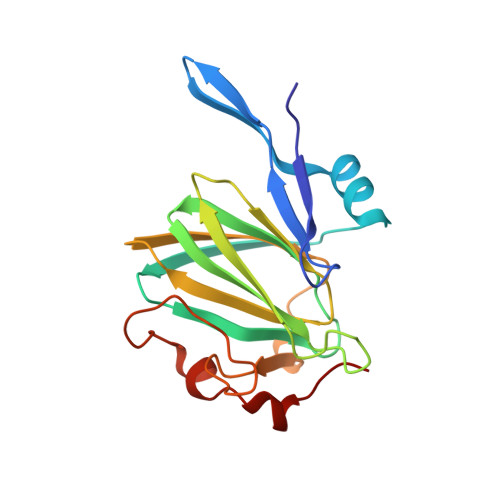Rmlc, a C3' and C5' Carbohydrate Epimerase, Appears to Operate Via an Intermediate with an Unusual Twist Boat Conformation.
Dong, C., Major, L.L., Srikannathasan, V., Errey, J.C., Giraud, M.F., Lam, J.S., Graninger, M., Messner, P., Mcneil, M.R., Field, R.A., Whitfield, C., Naismith, J.H.(2007) J Mol Biology 365: 146
- PubMed: 17046787
- DOI: https://doi.org/10.1016/j.jmb.2006.09.063
- Primary Citation of Related Structures:
2IXC, 2IXH, 2IXI, 2IXJ, 2IXK, 2IXL - PubMed Abstract:
The striking feature of carbohydrates is their constitutional, conformational and configurational diversity. Biology has harnessed this diversity and manipulates carbohydrate residues in a variety of ways, one of which is epimerization. RmlC catalyzes the epimerization of the C3' and C5' positions of dTDP-6-deoxy-D-xylo-4-hexulose, forming dTDP-6-deoxy-L-lyxo-4-hexulose. RmlC is the third enzyme of the rhamnose pathway, and represents a validated anti-bacterial drug target. Although several structures of the enzyme have been reported, the mechanism and the nature of the intermediates have remained obscure. Despite its relatively small size (22 kDa), RmlC catalyzes four stereospecific proton transfers and the substrate undergoes a major conformational change during the course of the transformation. Here we report the structure of RmlC from several organisms in complex with product and product mimics. We have probed site-directed mutants by assay and by deuterium exchange. The combination of structural and biochemical data has allowed us to assign key residues and identify the conformation of the carbohydrate during turnover. Clear knowledge of the chemical structure of RmlC reaction intermediates may offer new opportunities for rational drug design.
- Centre for Biomolecular Sciences, The University, St. Andrews KY16 9ST, UK.
Organizational Affiliation:

















